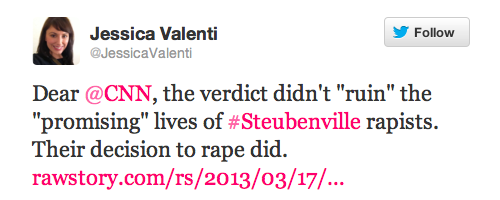 What do news organizations like CNN and health advocacy organizations like the Susan G. Komen Foundation have in common? They are examples of organizations that have been caught in the middle of a firestorm and don’t have the necessary policies in place to manage an online crisis immediately after it erupts. While CNN is in the business of researching and reporting on the news and Komen is in the business of raising money for breast cancer research, neither of them understands the human side of operating in a multichannel world where people are engaging with you 24/7. This is a significant failure on their part and is one of the key concepts discussed in the new book Social Change Anytime Everywhere that I co-wrote with Amy Sample Ward.
What do news organizations like CNN and health advocacy organizations like the Susan G. Komen Foundation have in common? They are examples of organizations that have been caught in the middle of a firestorm and don’t have the necessary policies in place to manage an online crisis immediately after it erupts. While CNN is in the business of researching and reporting on the news and Komen is in the business of raising money for breast cancer research, neither of them understands the human side of operating in a multichannel world where people are engaging with you 24/7. This is a significant failure on their part and is one of the key concepts discussed in the new book Social Change Anytime Everywhere that I co-wrote with Amy Sample Ward.
Since CNN reporters Poppy Harlow and Candy Crowley first broke the news about the Steubenville sentencing for the rape of a 16 year-old high school woman, the news network and the reporters have been flooded with criticism. In the past 48 hours, thousands of viewers have tweeted them, posted on their FB page, sent in comments via their web form, and signed online petitions about CNN’s lack of professionalism and insensitivity of their reporting. Many critics have asked the CNN reporters why they chose to focus on the emotional and life changing effects of the rapists rather than the victim. It lends to asking why CNN didn't have experts present to discuss important issues such as why weren't these teens educated about boundaries, and respect? Why weren't they educated about violence, and if they were, what compelled them to think rape was okay?
“Sexuality and power have to be part of the conversation with teenage boys,” said Rabbi Josh Feigelson Educational Director of Hillel's Ask Big Questions initiative, and yet this was not discussed by CNN on that newscast or even after they were flooded with criticism and suggestions for follow up news reports.

CNN’s silence and lack of engagement with their viewers (who also happen to be their largest critics at the moment) illustrates the need for organizations of all sizes to be proactive and focus on providing the best customer or constituent experience as possible across multiple channels. This is even more critical when you are caught in the middle of a public relations firestorm.
Three Tips to Operate Across Multichannels and Respond to Critics
Here are three tips to operate in a multichannel world where your constituents are also your biggest critics. Ironically these are similar tips I shared with a CNN reporter when I was interviewed for a story following the Newton tragedy and the NRA’s silence around the school shootings across online channels.
Be Human: Say “I’m Sorry”
All organizations mess up. Learn how to say “I’m sorry” publicly on your blog, on your website, on Twitter, Facebook, and any other channels you actively engage your audiences on. Whether you run a big corporation or a nonprofit, you are in the business of engaging with people. When you see a negative comment on your blog or social media channel, don’t delay your response. Many of these channels are public spaces and you don’t want people piling onto the criticism because you are not responding fast enough. Acknowledge people and address their concerns to build community. If you don’t have all of the facts or information to respond or help them, acknowledge it and tell them you are checking into it, and that you will update them shortly. It is better to say, “Thanks for your feedback. We are investigating and will post more information as soon as we can,” than it is to wait hours or days for the response with all of the information.
According to the Huffington Post, "two insiders at CNN exclusively told TheWrap that the controversy had hit reporter Poppy Harlow, covering the events in Steubenville, particularly hard."
Poppy said "she is taking this extremely personally as a woman," according to an executive. "She’s outraged that someone would think she’d 'do such a thing' as slant her coverage toward rapists. It’s gotten so out of control."
Unfortunatley Poppy does appear to be rising above the critisism and apologizing for offending many viewers with her reporting of the Steubenville sentencing. As a professional reporter working for one of the largest news networks in the world, she does not have the luxury to take things so personally. While Poppy's intentions may not have been to slant her coverage towards the rapists, that is how many viewers interpreted it. She cannot discount her viewers feelings. Poppy needs to listen to the feedback and focus her efforts on acknowledging the critisism to diffuse the firestorm.
Have an Online Engagement Guide
Having an online engagement guide for staff will be very helpful when managing an online crisis or public criticism. Here are a couple of things to consider when drafting the guide. When you need to issue an apology to your community, which department and staffers will be responsible for writing the apology and posting it? Who needs to quickly review it, before it’s shared publicly on online channels? When a specific staff person is criticized, will you allow that staff person to personally respond to the criticism? My recommendation is yes. If they don’t personally respond, it will appear as if they can’t speak up for themselves or take personal responsibility. What will your constituent commenting policy be on your blog, Facebook page, LinkedIn group, or Google+ group?
Don’t Ignore Your Community
The worst thing you can do is to ignore your community when things heat up. When the going gets tough, it’s not acceptable to bury your head in the sand and think their frustrations will just fade away. It can actually have the opposite effect and harm your brand. After the Komen debacle in early 2012 they had to hire a reputation consultant to assess how much damage was done to their brand. Learn from their mistakes and don’t let this happen to you.
For the last few years, there have been a lot of discussions in the marketing world around building communities based on openness and transparency. To achieve this you must be responsive. Your blog, social networks, and website should all be used to foster discussions with your community in real-time. These conversations make your community feel like your organization is accessible and that you value their opinions.
Facing criticism by your constituents can be scary. But these situations can actually be great learning opportunities. They teach us how to better engage with our audiences and often lead to some thought-provoking conversations around issues that are important to the people we serve.



COMMENTS